

7 Novels You Should Curl Up With If You Want A Good Cry. The weather is chilling up and the nights are creeping in earlier and earlier.

I don’t know about you, but this is the time that all I want to do is grab my softest blanket and lose myself in a book for hours, then finish it and get a good therapeutic cry going. Hilary Mantel on CS Lewis’s A Grief Observed. “No one ever told me that grief felt so like fear.”

With his first line, CS Lewis’s A Grief Observed reacquaints his reader with the physiology of mourning; he brings into each mouth the common taste of private and personal loss. “I know something of this,” you think. Even if you have not experienced a “front line” bereavement, such as the loss of partner, parent or child, you have certainly lost something you value: a marriage or a job, an internal organ or some aspect of mind or body that defines who you are. Perhaps you have just lost yourself on your way through life, lost your chances or your reputation or your integrity, or chosen to lose bad memories by pushing them into a personal and portable tomb. » 17 Brilliant Short Novels You Can Read in a Sitting.
This week author Ian McEwan expressed his love of short novels, saying “very few [long] novels earn their length.” Certainly it seems like a novel has to be a minimum of 500 pages to win a major literary award these days, and many genre novels have ballooned to absurd sizes. I love a good tome, but like McEwan many of my favorite novels are sharpened little gems. It’s immensely satisfying to finish a book in a single day, so in the spirit of celebrating quick reads here are some of my favorite short novels. In the Beginning Was the Sea by Tomás González review – a tragedy foretold. In the Beginning Was the Sea is not a usual first novel.
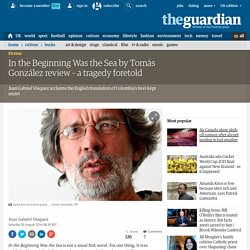
For one thing, it was published by a nightclub (where its author worked as a barman). La Vida Doble: A Novel by Arturo Fontaine – review. Prophets have been wailing since the beginning of time that misery is our lot.
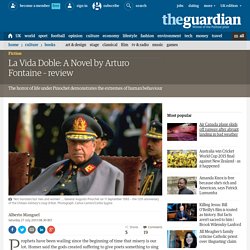
Homer said the gods created suffering to give poets something to sing about. The Spectre of Alexander Wolf by Gaito Gazdanov – review. Another masterpiece from someone I'd never heard of before published by Pushkin Press; how many more do they have up their sleeve?
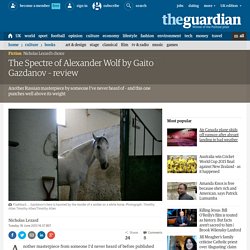
This time it is by Gaito Gazdanov, a Russian émigré novelist whose work was not published in his native country until the collapse of the communist regime. As he fought in the Russian civil war on the side of the White army, you can understand why. The novel begins during that war, as the narrator describes himself in flashback as a young soldier in southern Russia, shooting a man on a magnificent white horse. Although the murder was committed in self‑defence, it haunts him for the rest of his life, until, at some point between the wars, in Paris, he reads a book that ... Well, I could tell you, but that would spoil the story. What I can tell you is that this is a work of great potency, even though it's rather short, verging on novella length. (192 pages, and in Pushkin's traditionally beautiful pocket-sized format, not too many words per page.) The Light and the Dark by Mikhail Shishkin – review. Mikhail Shishkin is arguably Russia's greatest living novelist and the only writer so far to win all three major Russian book prizes.
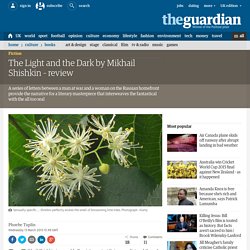
He recently refused to take part in an official delegation to an American book fair on the grounds that he did not want to represent a country where "power has been seized by a corrupt, criminal regime". The kind of contemporary literature in Russia that wins awards often favours postmodern style over plot and Shishkin's work is no exception, but his writing is richly textured and innovative and his themes are universal: love and death, pain and happiness, war and peace.
This partly explains why the UK publishers have called his latest novel The Light and the Dark. The Russian title, Pismovnik, is less Tolstoyan and means something like "Letter-book". The Light and the Dark, translated by Andrew Bromfield, is, superficially, a series of letters between a man and a woman. Midnight in the Century by Victor Serge review – life in the Stalinist Soviet Union. About halfway through this novel, we find ourselves at the head of a queue for cigarettes in the no-horse town of Chernaya (or “black-waters”).
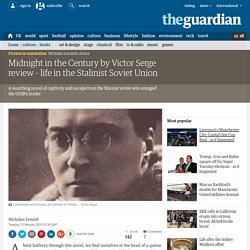
It’s , essentially a penal colony. There are two other queues, for bread and kerosene, but, as the novel puts it: “Right now the third queue, for cigarettes, is the most interesting since the cigarettes are there.” Anyway, Rodion – a young, self-educated man who’s ended up in Chernaya for innocently making the Communist party look ridiculous by, among other things, quoting from a year-old issue of Pravda – hands over his money, which the clerk just sweeps up and says “Next” without handing over the goods.
And why should he? “The counter-revolution,” as someone else in the queue explains, “has no right to them.” The best crime and thrillers of 2014. This year we welcomed some exciting new voices, with assured and perceptive police procedurals from Sarah Hilary (Someone Else’s Skin, Headline) and Eva Dolan (Long Way Home, Harvill Secker), both set in the UK.

Further afield, Paul Mendelson’s vivid Cape Town thriller, The First Rule of Survival (C&R Crime), may have a familiar protagonist in the form of the “heavy-drinking, weather-beaten” Colonel Vaughn de Vries, but it is atmospheric, complex and definitely worth the read. American journalist Caroline Kepnes’s first novel, You (Simon & Schuster), is an unsettling masterpiece of stalker fiction, set in New York with a cast who “care more about their status updates than their actual lives” and whose vanity and neediness lays them open to violence in the most appalling way. Another intriguing slow-burner is The Farm by Tom Rob Smith (Simon & Schuster)
. • Save at least 20% on these titles from the Guardian Bookshop. Conversation avec l'auteur de polars Jussi Adler-Olsen, l'écrivain danois le plus lu aujourd'hui. Il est l'un des auteurs de polars les plus en vue du moment.

Sans doute parce que Jussi Adler-Olsen tue ses canailles dans les rues du Danemark, l’un des pays les plus sûrs du monde. Crime fiction roundup – reviews. 1941: The Year That Keeps Returning by Slavko Goldstein – review. On 6 April 1941, Hitler's armies marched into Yugoslavia, responding to a military coup in which Serbian officers had overthrown a pro-Nazi government, thus endangering German strategy in the Balkans.
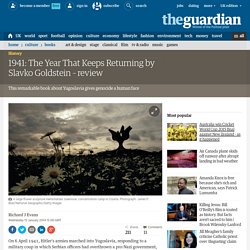
In less than a fortnight the country capitulated, overwhelmed by the Germans' superior firepower. Peripheral regions of the multinational state were immediately gobbled up by neighbouring countries while the Germans split the core into two, reducing Serbia to a rump and bringing in an exiled fascist, Ante Pavelić, to rule over an enlarged, independent Croatia. The new state's two million Orthodox Christian Serbs, 30,000 Gypsies and 45,000 Jews had hitherto lived more or less peaceably alongside its six million Roman Catholic Croats. All this was about to change. Avec Mirko Kovač, une grande voix des lettres yougoslaves disparaît. Mirko Kovač, l’un des plus grands écrivains contemporains de l’ex-Yougoslavie, est décédé à Rovinj le 20 août à l’âge de 74 ans.
Monténégrin de naissance, Mirko Kovač faisait partie de la génération la plus douée de la littérature yougoslave de la seconde moitié du vingtième siècle avec Danilo Kiš, Borislav Pekić ou Filip David. Mirko Kovač Né à Banjani, près de Nikšić (Monténégro), le 26 décembre 1938, installé depuis des années en Istrie, Mirko Kovač se considérait autant comme un écrivain monténégrin, croate, serbe que bosnien, et s’opposait à l’hystérie nationaliste qui a ravagé la région. Son langage littéraire reflétait cette position, basé sur la tradition et le développement de toutes les variantes standard d’une langue à quatre noms - ce qui lui a valu des critiques virulentes des nationalistes de toutes les couleurs.
Mirko Kovač a étudié la dramaturgie à la Faculté des arts dramatiques de Belgrade. Attaques. Aleksandar Hemon: A personal history of Sarajevo. An ice storm looms over Chicago and Aleksandar Hemon is going for a walk. Flat-capped, black-coated, his stride restricted by old football injuries, he gives the impression of a man older than he is. Hemon is tall, and has a shaved head. Seven Terrors by Selvedin Avdić – review. Sometimes the only way to write about something horrible is to do it obliquely. In Seven Terrors we see the Bosnian war of the early to mid-90s glimpsed fleetingly, out of the corner of the eye, like a ghost passing between two worlds. I choose that metaphor carefully, because this is a book in which two worlds are often in contrast, if not in conflict: the living and the dead, the time before a woman leaves a man and after, the pre- and postwar world, the spirit and human worlds, madness and sanity, dreaming and reality, Muslim and Christian, Muslim and atheist.
A bar owner, about to thump the drunken and abusive narrator, and relishing the moment, "was shining like a comet separating two epochs". The best books on Kenya: start your reading here. A Grain of Wheat by Ngugi wa Thiong'o On the threshold of independence in 1963, the residents of Thabai village prepare to celebrate the ceding of power to Kenyans. Beneath the surface, things are tense: the British colonials are leaving and there are scores to settle. A Man of Good Hope review – a refugee’s tale. Asad Abdullahi was eight years old when he awoke one day to find his mother pressed up against the door, peering nervously through the cracks. He joined her and saw five armed militiamen in their front yard, who started pushing, kicking and breaking down the door.
They made a hole in the wood – and then one shot his mother in the chest as he clung to her leg. This shocking killing ended with savage speed Asad’s contented childhood in Mogadishu. With his father in hiding as the Somali capital descended into chaotic meltdown, the young boy was swept aside on the tide of mayhem, migration and misery that swamped so many of his fellow countrymen. And thus begins an incredible story that starts with an innocent child drifting though dusty desert towns and concludes with a married man struggling for salvation in South Africa amid sometimes fatal hostility to foreigners. The Childhood of Jesus by JM Coetzee – review.
It's a relief after reading a lot of contemporary fiction to come across the sober prose of Coetzee. He doesn't shout at you. He doesn't try to force on you any kind of facial expression – of amusement or sympathy. He knows what he's doing but he's not going to tell you what that is, and I spent much of The Childhood of Jesus trying to figure it out. I can't say I have figured it out. The best books on Ethiopia: start your reading here.
William Dalrymple's top 10 books on Afghanistan. It is a very bad idea to invade Afghanistan; but as many authors have discovered, it is often a very good idea to write about it. Repression, religion and exile feature on shortlist for International prize for Arabic fiction 2015. Young and emerging writers dominate the International prize for Arabic fiction shortlist, which was revealed in Casablanca on 13 February. Maziar Bahari's Then They Came for Me. Mecca: The Sacred City review – an important study of one of the great religious sites. The best books on Libya: start your reading here. Children of the Jacaranda Tree by Sahar Delijani – review. Top 10 books about Cambodia. Cambodia: the end of an era « A year of reading the world. The best books on Indonesia: start your reading here. No One Writes Back by Jang Eun-Jin – review. Shyam Selvadurai returns with novel of raw human longing. The Hired Man by Aminatta Forna – review.
The Guest Cat by Takashi Hiraide review – a meditation on change. Dea Brøvig's top 10 Norwegian novels. Burial Rites by Hannah Kent – review. Penguin Random House Canada. Butterflies in November by Auður Ava Ólafsdóttir – review. The top 10 books of rural Wales. History of the Rain by Niall Williams review – pure eccentric entertainment. The 25 Best Websites for Literature Lovers. The 10 Best Books of 2014 - NYTimes.com. The Best Books Of 2014. The best fiction of 2014. Nadine Gordimer: five must-read books. A Reader’s Book of Days: A Reading List for the Most Disagreeable Month of the Year.
The 100 greatest novels of all time: The list. The top 10 civil war novels. Best holiday reads 2013. 100 Notable Books of 2013. 2014 in books: turn over a new leaf. The Observer's books of the year.